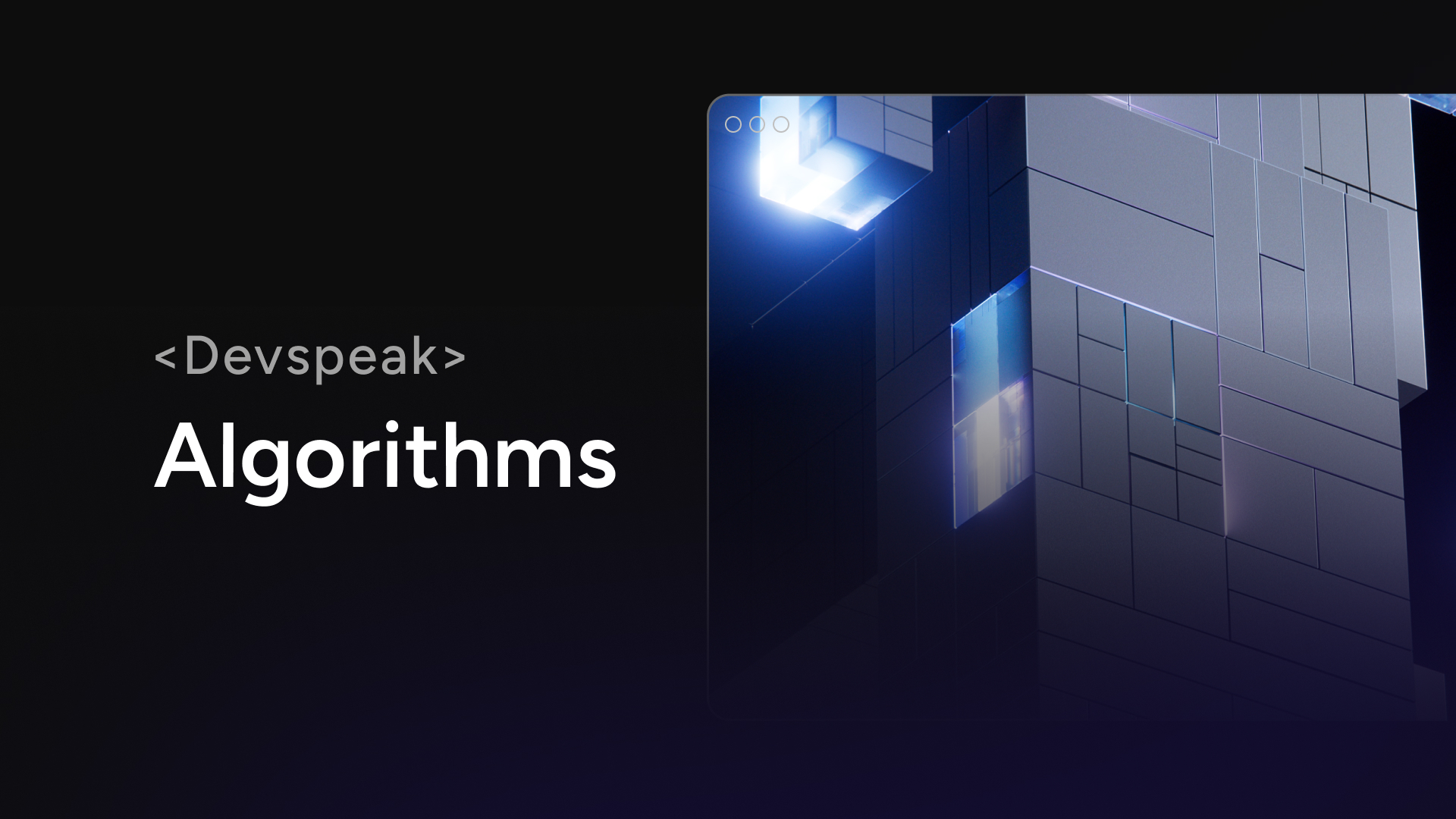Welcome back to DevSpeak, where we demystify the often confusing jargon that developers use. Today, we’re tackling a term you’ve probably heard a lot: “algorithm.” Algorithms are fundamental to programming and technology, but what exactly are they? Let’s break it down.
Algorithm, Defined
At its core, an algorithm is simply a set of instructions or a step-by-step guide designed to perform a specific task or solve a problem. Think of it like a recipe in a cookbook. When you follow a recipe to bake a cake, you’re executing an algorithm. You have a clear list of ingredients (inputs) and detailed steps (instructions) to transform those ingredients into a cake (output).
Al·go·rithm
/ALɡəˌrithəm/
NOUN – a process or set of rules to be followed in calculations or other problem-solving operations, especially by a computer.
LEARN MORE:
“What is an Algorithm? Introduction to Algorithms” – GeeksforGeeks.org, June 4th, 2024
Why Algorithms?
Algorithms are everywhere in the tech world, essential for making software and hardware function correctly. They are used to process data, make decisions and automate repetitive tasks. From sorting data in a spreadsheet to finding the shortest path in Google Maps, algorithms are behind the scenes making things work smoothly and efficiently.
Imagine you’re planning a road trip. You want to find the quickest route from your home to a distant city. You input your starting point and destination into a GPS app. The app uses an algorithm to analyze various possible routes, considering distance, traffic, and road conditions to suggest the best path. This algorithm ensures you get to your destination efficiently.
Types of Algorithms
Algorithms come in various types, each suited for different tasks. Here are a few common ones:
Sorting Algorithms: These arrange data in a particular order. Examples include QuickSort and MergeSort.
Search Algorithms: These find specific data within a large dataset. Examples include Binary Search and Linear Search.
Compression Algorithms: These reduce the size of data for storage or transmission. Examples include ZIP and JPEG compression.
Encryption Algorithms: These protect data by converting it into a secure format. Examples include AES and RSA.
LEARN MORE:
“What is an Algorithm? Defining and Applying Algorithms” – Forbes Tech, January 2024
Algorithms in Web3
In the context of Web3, algorithms play a critical role in blockchain technology and decentralized systems. They ensure the integrity, security and efficiency of web3 powered platforms and blockchains themselves. For instance, consensus algorithms like Proof of Work (PoW) and Proof of Stake (PoS) are vital for validating transactions and maintaining a blockchain’s integrity.
Algorithms in Action: Smart Contracts
Smart contracts are self-executing contracts with the terms directly written into code. Algorithms within these contracts automatically enforce and execute the terms when predefined conditions are met, ensuring transparency and reducing the need for intermediaries.
SEO and Algorithms
Search engines like Google use complex algorithms to rank websites. These algorithms evaluate hundreds of factors to determine which sites provide the best answers to users’ queries. Understanding these algorithms can help developers optimize websites to rank higher in search results, making SEO (Search Engine Optimization) a vital skill.
For a content, product or service provider to maximize their reach and capture the attention of as many people as possible in today’s hyper connected world, they must learn to understand search engine algorithms inside and out.
LEARN MORE:
“10 Actionable Insights From the Google Algorithm Leak” – CMSWire, June 2024
In Social Media
The term “algorithm” rose to prominence in the mainstream with the rise of social media during the web2 era, which will likely be remembered as the social media era. Perhaps the most commonly known algorithmic activities today are the ones that determine what you’ll see on your social media feed.
In the earliest days of social media, you would simply see everything posted by those you followed or your designated friends. But as the social media industry evolved, we began to see much more complex behaviors from sites like Facebook, Twitter and Instagram. They began to show you only what their complex algorithms wanted you to see, based on the information they had collected from you (with your permission, thanks to your acceptance of extensive terms and conditions).
As these networks of algorithms grew more robust and users contributed more and more data to the social media platforms, our “feeds” began to know us very well. This is how scrolling a feed became one of the most satisfying (and unfortunately, addictive) activities humans have ever experienced. The algorithms knew exactly what kind of content was worthy of our individual attention at that moment. It’s truly fascinating to look back at all the ways that social media algorithms have changed the lives of not only those who use social media networks, but everyone in the world.
LEARN MORE:
“2024 Social Media Algorithms: A Guide for all Networks” – Hootsuite blog, March 2024
Algorithms are the backbone of the digital world, powering everything from simple calculations to complex blockchain systems. They transform inputs into outputs through a series of well-defined steps, making technology functional and efficient. Whether you’re navigating with a GPS, securing data or interacting with a blockchain like GalaChain, algorithms are at work, ensuring optimal performance.
Previous DevSpeak Articles
That’ll do it for this DevSpeak, but we’ll be back soon to dispel the confusion around other common tech terms. If you’ve missed any of our previous editions, check them out below!





